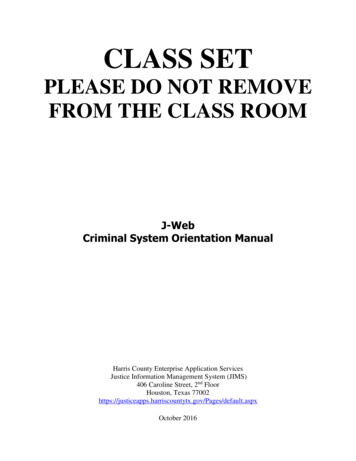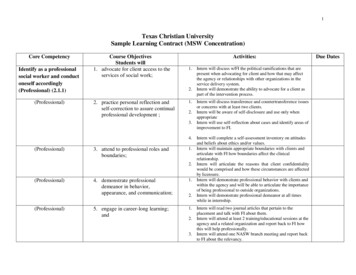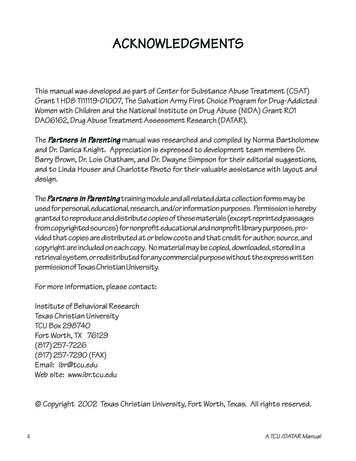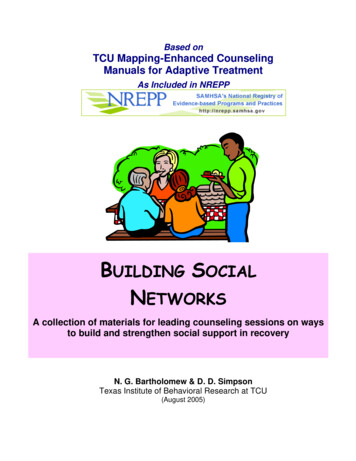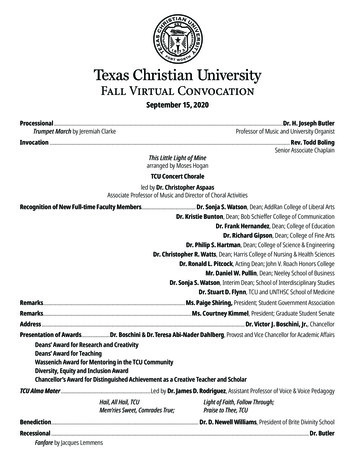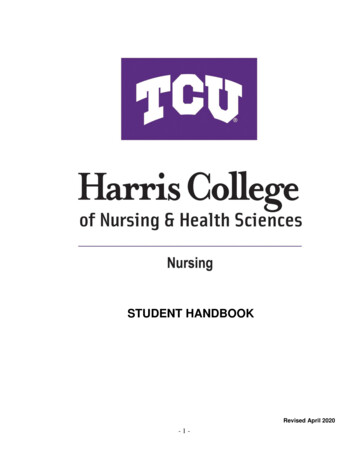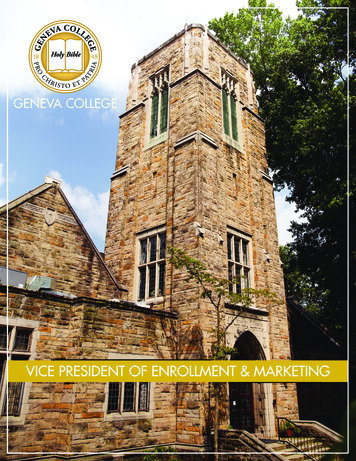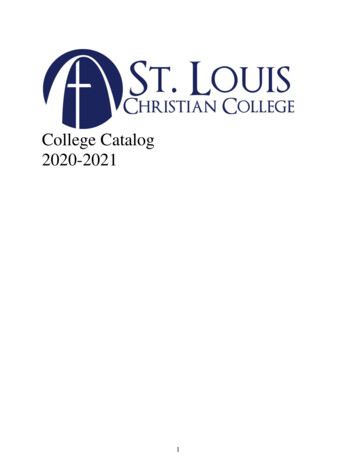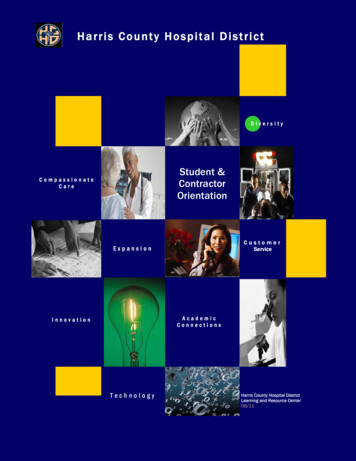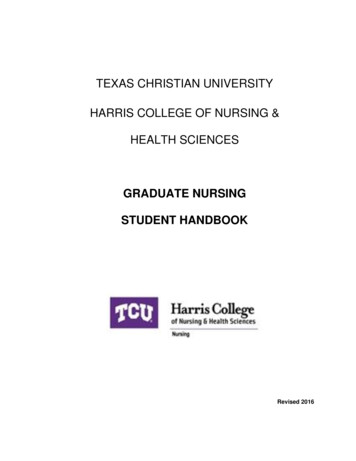
Transcription
TEXAS CHRISTIAN UNIVERSITYHARRIS COLLEGE OF NURSING &HEALTH SCIENCESGRADUATE NURSINGSTUDENT HANDBOOKRevised 2016
Table of ContentsPageWelcome . 1TCU Nursing Mission, Philosophy, Program Goals & Student Outcomes. 1-2Accreditation, Certification and Licensure . 2Student Abilities . 2-3Change in Health Status . 3Student’s Responsibility . 3Mid-semester Grades . 4Program ObjectivesMSN Program Objectives . 4DNP Program Objectives . 4Graduate Nursing Enrollment and Progression PoliciesProgression Policy . 4-5Program Interruptions for Life Events Policy . 5Residency Policy. 5Transfer Credit Policy . 5Intent to Graduate Policy . 6Expectations of Graduate Nursing Students in Concepts and Practica CoursesAttendance in Online Classes . 6Attendance in Clinical Practica . 6University Emergencies and Closures . 6-7Examinations . 7Quizzes/Study Questions/Assignments . 7On-Campus Intensives (OCIs) . 7Medication Administration . 7Professional Attire, Behavior . 7-8Professional Conduct Statement . 8-9Unsafe Nursing Practice. 9Code of Ethics for Nursing . 9-10Student Fees . 10Required Health Insurance. 10Immunizations and Documentation required prior to enrollment in Clinical Courses . 10-11HIPAA Policies . 11-14Student Confidentiality Agreement Statement . 14Use of Standard Precautions Policy for Bloodborne Pathogen Exposure . 14Criminal Background Check and Drug Testing Policy and Consequences . 14-16Guidelines for Use of Clinical Preceptors for Student Experiences: Preceptor,Faculty and Student Responsibilities . 16-18Criteria for Selection of Clinical Facilities for Graduate Students . 19Guidelines for Management of Incidents and Medication Errors . 19Student Clinical FormsAcknowledgement of TCU Nursing Policies & Procedures: Student Signature Form . 20Clinical Preceptor Agreement . 21Informed Consent and Assumption of Risk Form. 23
WELCOMEWelcome to Texas Christian University (TCU) and the Harris College of Nursing and HealthSciences (HCNHS) Graduate Nursing Program. During the next several semesters you willlearn the art and science of professional nursing, gaining career skills designed to carry you wellinto the 21st century. The TCU-Nursing Graduate Student Handbook contains the policies andprocedures that apply to nursing students at TCU. The Handbook also introduces the standardsof professional nursing. In order for TCU-Nursing to provide the best educational preparationfor you, all of us—faculty, staff, and students—are accountable for the information contained inthis handbook.We value your choice to become a student in our program, recognizing the privilege andresponsibility you have granted us. Welcome to TCU-Nursing.TCU NURSING PROGRAMSThe TCU Nursing Program endorses the Mission and Vision of TCU. The specific vision of theprogram is to uphold academic and practice environments that foster excellence in professionalnursing. The mission of the program is to promote health by liberally educating ethical nurseleaders who provide competent, evidence-based care and by advancing scholarship thatinforms the discipline and practice of nursing (Accepted September 9, 2010). TCU NursingProgram is dedicated to professional nursing education based on a foundation of liberal arts,sciences, and humanities and to the promotion of an environment that encourages lifelonglearning. The Harris College of Nursing & Health Sciences further affirms to enhance the humancondition by preparing graduates who think and practice as ethical leaders, and advancingknowledge of health and human development with the global community.PhilosophyThe faculty of TCU-Nursing, an academic unit of TCU, affirms that individuals are holistic beingswho possess inherent worth. The faculty believes that the education of the professional nurseshould prepare a graduate who exhibits qualities of mind and character that are necessary tolive a fulfilling life, act in the public interest locally and globally, and promote health and thenursing profession. The teaching/ learning process is multidimensional and interactive,involving affective, cognitive and psychomotor changes. A liberal educational foundationassists persons to think critically and to seek improvement in themselves, the profession, andsociety. A liberal education provides the basis for the development of core competenciesand knowledge of professional nursing. The TCU-Nursing faculty embraces the professionalvalues of altruism, autonomy, human dignity, integrity, and social justice. Nursing practice,conduct, and relationships are guided by professional standards and the ANA Code of Ethics.Sound clinical judgments characterize the practice of the professional nurse in providing safe,humanistic care of individuals, families, and groups in and across diverse environments.Portions of the above are based on the current Essentials of Baccalaureate Educationfor Professional Nursing Practice, published by the American Association of Colleges of Nursing(1998), Washington, DC.TCU Nursing Program GoalsThe program goals of TCU-Nursing are as follows: Prepare graduates who are competent to meet the unique, multiple, and complex humanhealth needs of a global society. Promote values and behaviors that encourage respect for diversity, acknowledge humanworth and dignity, and support professional nursing practice. Foster an appreciation for the necessity of learning, thinking critically, and continuing to1
grow personally and professionally. Contribute to the nursing profession and to society by engaging in scholarship, leadership,and service. Support the University’s mission, vision, core values, and goals.Expected TCU Nursing Student Outcomes1. Demonstrate effective oral and written communication skills.2. Provide health education to facilitate informed choices by clients and positive healthoutcomes.3. Apply the nursing process to organize and provide comprehensive, holistic nursingcare.4. Use information and health care technology to enhance nursing practice.5. Analyze health care systems, policies, and global issues impacting health care.6. Incorporate legal, ethical and professional standards in one’s own professional nursingpractice.7. Use evidence as a basis for professional nursing practice.8. Participate as a member of the interdisciplinary health care team.9. Manage resources to promote effective client outcomes.10. Demonstrate ethical leadership and responsible citizenship through leadership andservice activities.Accreditation and LicensureThe TCU Nursing Program, enabled by a trust fund established by the late Dr. Charles HoustonHarris, was organized as an academic unit of TCU in 1946. The College achieved nationalaccreditation in 1952 and has remained fully approved by the Board of Nursing for the State ofTexas, P.O. Box 430, Austin, TX 78767-0430, 512-305-7400. In addition to BON approval, theCommission on Collegiate Nursing Education (CCNE), One Dupont Circle, NW, Suite 530,Washington, DC, 20036-1120, 202-887-6791, granted full accreditation in April 2001.Accreditation has been maintained for all programs.STUDENT ABILITIESIn support of the 1973 Americans with Disabilities Act the faculty of TCU Nursing hasdefined the scope of nursing as it applies to the disabled or rehabilitating student.To enter, remain and progress in the nursing program, all students must have the followingabilities. Examples of abilities listed below are not inclusive. Students must have sufficient physical mobility to travel independently to and withinhospitals, homes, clinics, schools, and other health-related agencies. They must have thegross and fine motor capability to provide safe care to clients independently. This requiresthe ability to sustain work requiring delivering services at the bedside, standing/walking for8-12 hours, traveling independently, reaching, bending, lifting up to 50 pounds, and quickmovements.Students must have sufficient tactile and manual dexterity to (a) accurately manipulateequipment, (b) complete a physical assessment (palpation, percussion, auscultation), (c)prepare and administer medications, (d) legibly print dates and times on medication vials,(e) perform cardiopulmonary resuscitation, (f) use a computer keyboard, (g) legibly andaccurately document nursing care, and (h) perceive attributes of objects such asdimension, shape, temperature or texture.2
Students must have sufficient visual acuity to (a) observe subtle changes in clients’conditions, (b) accurately read medical records and orders, (c) accurately read a computermonitor screen, and (d) legibly and accurately document nursing care.Students must have the auditory acuity with and without background noise that enablesthem to assess the physical status of a client (breath sounds, heart sounds, etc.).Students must possess sufficient sensory function to recognize alarm and telephonesignals.Students must have sufficient receptive, written and oral communication skills to accuratelyreceive, read, interpret and comprehend the English language in written and verbal forms inorder to (a) to communicate effectively and professionally with clients, faculty, staff, andpeers from a variety of social, emotional, cultural and intellectual backgrounds; (b) teachclients and families; (c) accurately document, interpret, and comprehend nursinginterventions and actions and client responses; and (d) communicate data about clients in atimely manner.Students must have sufficient emotional stability and cognitive skills to (a) processinformation in a reasonable amount of time; (b) make clinical judgments accurately; (c)identify cause and effect relationships in clinical situations; (d) establish and maintainappropriate relationships with clients, faculty, staff, and peers; and (e) have adequateenvironmental awareness in multiple, complex settings that may be stressful and noisy andmay be potentially harmful. This includes exposure to communicable diseases, personalinjury, death of patients, and violence in the workplace.TCU provides reasonable accommodations for each student who has a physical, medical,psychological or learning disability. If you have a disability, and have not submittedinformation concerning that disability to the university, please contact the Coordinator forStudents with Disabilities as soon as possible. For more information regarding disabilitiesservices, contact:Center for Academic ServicesTexas Christian UniversityTCU Box 297710Ft Worth, TX 76129817-257-7486CHANGE IN HEALTH STATUSStudents who experience a change in their health status that may affect their ability to functionsafely or meet course objectives in the practicum and/or classroom setting must notify theirassigned faculty. The faculty member may require documentation from the student’s healthcare provider indicating the student’s functional abilities and/or limitations.STUDENT’S RESPONSIBILITYThe faculty and academic advisers are available to help students understand and meetacademic requirements for a degree, but the students themselves are responsible forunderstanding and fulfilling the requirements. The degree cannot be awarded until allrequirements as defined by the TCU Catalog are met. It is essential that each student becomefamiliar with all requirements and remains informed throughout the program.3
MID-SEMESTER GRADESAfter mid-semester grades are received, the faculty will identify students with unsatisfactoryprogress in any course. Students will be sent an academic and/or clinical warning letter fromthe Registrar. It is the student’s responsibility to seek the assistance necessary to successfullycomplete the course in question.PROGRAM OBJECTIVESMSN Program Objectives1. Demonstrate competence to meet the unique, multiple, and complex human healthneeds of a global society.2. Advance a culture of excellence through lifelong learning.3. Build and lead collaborative interprofessional care teams.4. Navigate and integrate care services across the healthcare system.5. Design innovative nursing practices.6. Translate evidence into practice.7. Utilize scientific knowledge to evaluate new and current approaches in nursing practiceand healthcare delivery to promote optimal outcomes.8. Employ ethical principles to decision-making in healthcare practices and systems.DNP Program Objectives1. Demonstrate advanced levels of clinical judgment and scholarship in nursing practice.2. Utilize scientific knowledge to evaluate new and current approaches in nursing practiceand healthcare delivery to promote optimal outcomes.3. Provide leadership in organizations and systems to assure quality care delivery models.4. Design, deliver, direct, and disseminate evidence-based practices.5. Use information systems to design, select, use, and evaluate programs of care,outcomes of care, and care systems.6. Advocate for healthcare practice change through policy development and evaluation.7. Assume leadership roles for effective transdisciplinary collaboration to achieve optimaloutcomes.8. Employ ethical principles to decision-making in healthcare practices and systems.GRADUATE NURSING ENROLLMENT AND PROGRESSION POLICIESThe University policies for enrollment, progression, probation, and suspension can be found inthe TCU Graduate Studies Catalog, which can be found at: http://catalog.tcu.edu. The Nursingpolicies are found in the HCNHS section of the Catalog.Progression PolicyGraduate students are expected to meet the academic standards required by the university andfound in the TCU Graduate Bulletin. Graduate students must achieve a semester andcumulative GPA of at least 3.00, indicating the minimum acceptable letter grade of B.Regardless of overall GPA, any student receiving a C grade in any course will be placed onacademic probation for the next semester. By the end of the probationary semester, the studentmust meet both semester and cumulative minimum GPA. Students on academic probation are4
not eligible for registration in independent study courses. A grade below C is considered afailure. Any student receiving two C grades during the program may be dismissed. A studentwho is placed on academic probation for one semester will be dismissed if the semester orcumulative GPA falls below a 3.00 in any subsequent semester.A student may receive grade of F or be administratively withdrawn from a course for lack ofacademic progress in the course, for unprofessional or unsafe conduct, or for receivingdisciplinary action from the Board of Nursing. The student may further be dismissed,suspended, or expelled from the University. Recommendation for such action originates with thefaculty of record for the course and requires approval of the Associate Dean for Nursing.Program Interruptions for Life Events PolicyUnexpected life events occasionally result in the need for graduate nursing students to dropfrom full time status to part time status or to miss a semester or semesters. Life events can be:1. Individual – examples include: personal illness or injury; job loss or change; and pregnancy.2. Family-related – examples include: illness, injury, or death of a family member; marriage;separation/divorce; issues with children; and unexpected relocation.3. Environmental – examples include: natural disasters like hurricanes, tornadoes, fire, andflooding.The graduate student experiencing such an event will contact the Program Director andDivision Director, Nursing Graduate Studies & Scholarship. Together, the student and directorwill draft an altered plan of study. If the student requires a semester or semesters off, thestudent and program director will mutually agree on the date of the student’s return to theprogram.If the student follows the mutually agreed upon plan or renegotiates for an alternate plan, thestudent will be considered a continuing student in the program. If the student does not followthe plan, the student may be dropped from the program and will have to reapply forreadmission.Residency RequirementOnline students do not have to meet the residency requirement required for on-campusstudents.Transfer Credit PolicyGraduate credit earned from another accredited college or university may be considered fortransfer to the nursing graduate program, if courses have been taken within the past five years.Written request for transfer credit with two copies of official academic transcripts reflecting therequested credit should be made at the time of application for admission. Such credit must beapplicable to the student’s program as determined by the Division Director, Nursing GraduateStudies & Scholarship, carry at least a “B” grade, and be coursework taken through anaccredited school of nursing. Six semester hours of transfer credit usually is all that will beaccepted.Intent to Gra
informs the discipline and practice of nursing (Accepted September 9, 2010). TCU Nursing Program is dedicated to professional nursing education based on a foundation of liberal arts, sciences, and humanities and to the promo
